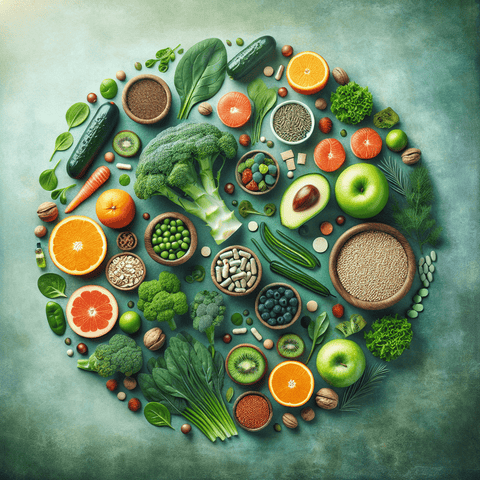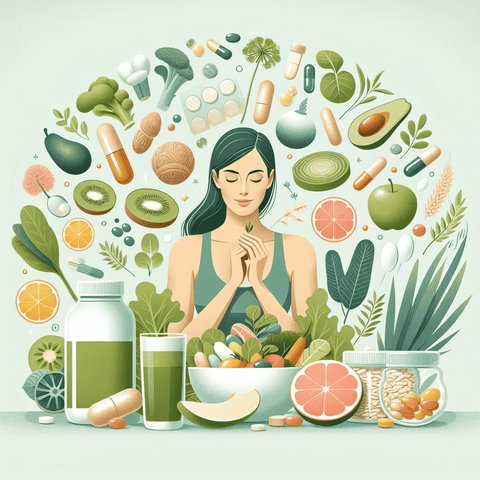Introduction
In today’s fast-paced world, maintaining a healthy diet that supports overall wellness and optimizes the benefits of nutritional supplements is more crucial than ever. Many people take supplements to compensate for dietary gaps, but these are most effective when paired with the right foods. This comprehensive guide answers the age-old question: “What should I be eating every day?” by focusing on how to build a sustainable, nutrient-rich diet that complements your supplement routine, boosts energy, supports immunity, and encourages overall well-being. From understanding food synergy with supplements to meal planning tips, superfoods, and snack guidance, this in-depth post provides all the tools you need for a vibrant lifestyle.
Prioritizing Healthy Eating to Support Your Nutritional Supplement Routine
Nutritional supplements are designed to support what may be lacking in your diet, but they’re not intended as substitutes for real, whole foods. A healthy, balanced diet lays the foundation for optimal absorption and effectiveness of supplements. Without the right nutritional groundwork, many supplements can’t bind, metabolize, or absorb properly within the body.
For example, fat-soluble vitamins such as Vitamin D and Vitamin K require dietary fats for proper absorption. If your daily diet lacks healthy fats like olive oil, avocados, or fatty fish (such as salmon), these supplements may pass through your system without being fully utilized. A nutrient-dense diet fills in the blanks by creating the optimum internal environment for these nutrients to do their job.
Here are a few strategies for integrating supplements into an everyday whole food diet:
- Always take fat-soluble vitamins with meals that include healthy fats.
- Pair vitamin C-rich foods like citrus fruits, bell peppers, and broccoli with iron-rich foods to enhance iron absorption naturally.
- If taking magnesium supplements, include magnesium-rich whole foods like leafy greens and whole grains for consistency.
Foods are complex structures that contain co-factors, enzymes, and fibers that work together to promote better digestion and nutrient uptake. In contrast, supplements often deliver isolated forms of nutrients. When both are used in harmony, they offer a comprehensive approach to wellness. By prioritizing whole foods and understanding the synergy between food and supplements, you create a nutrient-rich base supporting everything from energy levels to immune function.
Nutrient-Rich Foods That Boost Your Daily Nutritional Intake
When constructing your daily meals, variety and color on your plate aren’t just aesthetically pleasing—they’re nutritionally vital. A diverse array of foods ensures you get a broad spectrum of essential nutrients, from macronutrients—carbohydrates, proteins, and fats—to a wide array of micronutrients including vitamins, minerals, and antioxidants.
A daily intake of fruits, vegetables, whole grains, lean proteins, and healthy fats forms the backbone of the Mediterranean and DASH diets, both science-supported patterns associated with reduced chronic disease risk and enhanced mental and physical health.
Here’s how to build your plate:
- Fruits and Vegetables: Aim for at least 5 servings per day, focusing on a mix of colors to ensure a range of phytochemicals. Citrus fruits, for instance, support Vitamin C intake, aiding immune health and antioxidant protection. Leafy greens provide magnesium, calcium, and Vitamin K.
- Whole Grains: Opt for oats, quinoa, brown rice, and barley. They provide long-lasting energy and contribute to B-vitamin and mineral intake. The fiber also aids digestion, which can enhance nutrient absorption from supplements.
- Lean Proteins: Incorporate plant- and animal-based sources like beans, lentils, chicken, and fish. Fish such as salmon or sardines are not only high in protein but also a top source of omega-3 fatty acids, which support heart and cognitive health.
- Healthy Fats: Avocados, olive oil, nuts, and seeds provide the fats needed to absorb vitamins A, D, E, and K efficiently.
Some nutrient-dense foods synergize particularly well with supplements. For example, eating peppers or tomatoes can optimize iron absorption when taking iron capsules. Including probiotic and prebiotic foods—such as yogurt and garlic—can enhance gut health, thereby improving the absorption and efficacy of all supplements.
Portion control is also essential for maintaining a healthy nutrient ratio and preventing an overload of any single nutrient, whether from food or supplements. Use visual guides (like a serving of meat being the size of your palm, or a serving of grains the size of your fist) to avoid micronutrient and macronutrient imbalances.
Balance Your Diet with Smart Diet Tips for Effective Supplementation
A well-balanced diet goes beyond the sum of its food groups. To optimize your food and supplement synergy, take into account the timing, combination, and daily requirement of each nutrient.
Timing Supplements with Meals: Supplements, especially fat-soluble ones, should be taken with meals containing fat to help improve absorption. For example, taking Vitamin D with a meal containing fish or avocado ensures that it’s effectively absorbed into the bloodstream.
Avoiding Overlaps and Preventing Deficiencies: While it may be tempting to consume fortified foods alongside supplements, caution is advised to avoid overdosing on certain vitamins and minerals. For instance, excessive intake of Vitamin A from both diet and supplements may exceed recommended levels. Use an app or simple food journal to track nutrient intake and plan accordingly.
Managing Macronutrient Ratios: Carbohydrates, proteins, and fats not only supply energy but help deliver certain vitamins. A balanced macronutrient ratio also stabilizes blood sugar, supports energy throughout the day, and ensures satiety. For those supplementing with omega-3, for example, keeping saturated fat intake in check helps avoid inflammatory competition within the body.
Hydration’s Role in Nutrient Utilization: Water intake is often underestimated in augmenting nutrient absorption. Many vitamins are water-soluble (e.g., B-complex and vitamin C), meaning taking them with adequate water ensures better dissolution and circulatory transport. Stay hydrated, aiming for 2–3 liters per day, especially if you are on a high-protein or high-fiber diet.
Personalization Based on Health Goals: Your age, activity level, and health objectives deeply influence what and how much you should be eating. A sedentary adult needs fewer calories but perhaps more anti-inflammatory foods to support joint health. An athlete may need higher protein, magnesium, and omega-3s. Catering your meal and supplement timing to your lifestyle will yield the best outcomes.
Incorporating Daily Superfoods for Enhanced Nutritional Benefits
Superfoods are nutrient powerhouses that go above and beyond typical foods in terms of nutrient density, antioxidant capacity, and therapeutic potential. Including a variety of these in your daily meals can help improve immunity, cognitive performance, digestive health, and even the appearance of your skin—especially when aligned with your supplement strategy.
Some of the most scientifically researched and recognized superfoods include:
- Blueberries: Rich in antioxidants and flavonoids which support brain and cardiovascular health.
- Chia Seeds: Excellent source of fiber and ALA omega-3s, useful when paired with EPA and DHA supplements.
- Kale: Packed with fiber, folate, and vitamin K, kale supports bone health and complements supplement intake.
- Wild-Caught Salmon: Provides high-quality protein and natural omega-3s, boosting cardiovascular and cognitive wellness.
- Acai Berries: Very high ORAC scale, indicating robust antioxidant properties that aid in neutralizing free radicals.
These superfoods are known to work synergistically with many supplements. For instance, consuming salmon alongside omega-3 capsules can enhance the overall intake and sustain cell membrane integrity. Blueberries may boost immunity when added to a smoothie containing Vitamin C supplements, offering both flavonoids and ascorbic acid for a doubled-down immune defense mechanism.
Incorporating these into your meals doesn't need to be time-consuming. Toss chia seeds into your breakfast oats or shake. Sprinkle kale into soups or blend it into smoothies. Use acai purée in smoothie bowls with Greek yogurt and granola. With strategic preparation, your daily meals can become nutrient-dense and supplement-friendly fuel.
Wholesome Meal Ideas that Combine Nutritional Powerhouses and Supplements
Creating balanced meals from scratch is one of the most rewarding ways to ensure synergy between food and supplements. Below are some practical meal ideas that support nutrient absorption and overall well-being.
Breakfast: Try a smoothie bowl with spinach, chia seeds, blueberries, a banana, and almond milk. Add a scoop of plant protein and take your B-complex or omega-3 supplement alongside. The healthy fats from chia help process fat-soluble vitamins. Top with crushed walnuts, which are high in alpha-linolenic acid (ALA).
Lunch: Prepare a warm quinoa bowl topped with grilled chicken, kale, boiled eggs, roasted sweet potatoes, and hummus. This meal is high in magnesium, iron, and protein. Add bell peppers or citrus segments to amplify iron absorption. Consider taking your Vitamin K supplement here to ensure synergy with leafy greens like kale.
Dinner: Go for grilled salmon, paired with quinoa, steamed broccoli, and an olive oil drizzle. Quinoa adds complete plant protein, broccoli is rich in vitamin C and fiber, and olive oil aids fat-soluble vitamin absorption. This is an ideal time to take your Vitamin D supplement, since it pairs well with the fatty fish and fats in the olive oil.
Meal Prep Tips:
- Cook large portions of grains and proteins to use across multiple meals.
- Chop and store vegetables for easy access during the week.
- Create balanced plate templates focused on produce + proteins + healthy fats.
By integrating supplement-intelligent foods into each meal, you promote nutrient diversity and avoid dependence on single sources. This style of eating supports sustainable, long-term health.
Nutritious Snack Options for Quick Energy and Nutrient Boosts
Snacking often gets a bad rap, but when done right, it can be a strategic opportunity to fill nutritional gaps. The key is to choose snacks that are whole-food based, nutrient-rich, and aligned with your supplement habits.
Healthy Snack Examples:
- Greek yogurt with seasonal fruits – supports digestion and offers natural probiotics that may enhance supplement uptake.
- Raw nuts and seeds – almonds, walnuts, pumpkin seeds are rich in magnesium and healthy fats.
- Veggie sticks with hummus – crunchy and satisfying, they provide fiber, vitamins, and protein in one bite.
Pairing snacks with particular supplements can help with both compliance and performance. For example, having a small bowl of berries with a glass of water and your Vitamin C supplement in the afternoon can support energy while enhancing antioxidant protection. Nuts taken with an omega-3 capsule in mid-morning can supply complementary fatty acids.
Avoid ultra-processed snacks high in refined sugars, hydrogenated oils, and artificial additives. These not only contribute empty calories but can promote inflammation, potentially offsetting benefits from high-quality supplementation. Instead, create energy balls with oats, chia, nut butter, and honey for a homemade grab-and-go treat.
Final Tips: Creating a Daily Eating and Supplement Routine for Long-Term Wellness
The key to lasting health isn’t about sudden changes or rigid food rules. It’s about developing consistent patterns that support both your body’s needs and your supplement plan. Daily food and supplement routines help establish a rhythm your digestive and endocrine systems can follow, improving overall effectiveness.
Tips for Success:
- Anchor your supplement routine to meals—breakfast for B-complex and probiotics, lunch or dinner for fat-soluble vitamins.
- Use a weekly meal planner to ensure variety in color, nutrients, and preparation methods.
- Listen to your body. Energy dips, changes in digestion, or poor sleep might indicate nutrient imbalances.
- Work with a registered dietitian or healthcare provider before adding high-dose supplements or changing medication regimens.
- Stay updated on new research, trends in superfoods, and supplement innovations via trusted resources like Topvitamine.com.
Wellness is a journey, not a destination. Stay mindful, make incremental progress, and remember that the effort you make daily compounds into lifelong benefits.
Q&A Section
Q: Can I rely on supplements alone if I have a busy lifestyle?
A: Supplements help fill nutritional gaps, but they are most effective when used as complements to a balanced, whole-food diet.
Q: What is the best time to take fat-soluble vitamins?
A: With meals containing dietary fats (e.g., olive oil, avocado, salmon) to improve absorption.
Q: Are there foods that can interfere with supplement absorption?
A: Yes. Calcium can hinder iron absorption; caffeine may disrupt B-vitamin metabolism if consumed close together.
Q: How can I improve the absorption of Magnesium?
A: Take magnesium supplements with foods like leafy greens, whole grains, and nuts, preferably in the evening as it promotes relaxation.
Q: Are superfoods like acai and chia seeds worth including daily?
A: Yes, when paired with quality supplements, they enhance nutrient density and overall wellness.
Important Keywords
- daily healthy eating
- nutrient-rich foods
- supplement routine
- superfoods for health
- balanced meals
- vitamin D supplements
- magnesium in diet
- omega-3 DHA EPA
- nutrition absorption tips
- foods that boost supplements



